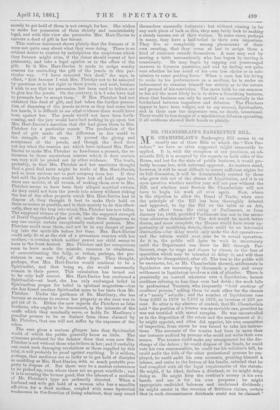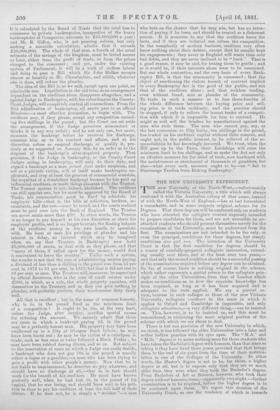MR. CHAMBERLAIN'S BANKRUPTCY BILL.
MR. CHAMBERLAIN'S Bankruptcy Bill seems to us exactly one of those Bills to which the " New Pro- cedure" we have so often suggested might reasonably be
applied. It is, with the exception of one provision, an ad- mirable Bill, it is accepted by the experts on both sides of the House, and but for the state of public business, it would pro- bably become law, with universal approval. As matters stand, however, it will be most difficult to secure sufficient nights for its full discussion, it will be determinately resisted by those who grow rich out of the abuses of Liquidation, and it is an open question whether another year will not pass without the Bill, and whether next Session Mr. Chamberlain will not have to begin his work all over again. Now, where is the objection to allow the Board of Trade, when once the principle of the Bill has been thoroughly debated and approved, to lay the Bill on the table as an Act, to take effect from the rising of Parliament, or from
January 1st, I882, provided Parliament has not in the mean-
time otherwise determined I The Act would be much better drawn, and more complete, the Houses would have every op- portunity of modifying details, there could be no interested obstruction—for delay would only make the Act operative— and the reform would next year be in actual operation.
As it is, the public will have to wait in uncertainty until the Department can force its Bill through Par- liament, stage by stage and clause by clause, in the face of opposition which may be intended to delay it., and will then probably be disappointed, after all. The loss to the public will be enormous, for, as Mr. Chamberlain showed, settlements in liquidation are increasing by thousands a year, and every settlement in liquidation involves a risk of plunder. There is practically no control whatever over a liquidation, honest creditors refusing to lose time over bad debts ; the work falls
to professional Trustees, who frequently "hold auctions of creditors' proxies," selling them to each other for the chance
of a " meaty " swindle ; and the number of liquidations rose from 2,035 in 1870 to 7,107 in 1879, an increase of 250 per cent. So utter is the absence of control, that Mr. Chamberlain said " the position of a trustee was an enviable one, provided he was not troubled with moral scruples. He was uncontrolled as to the disposition of the estate and the management of it; lie might appoint, and often did appoint, his own committee of inspection, from whom he was bound to take his instruc- tions. . The accounts of the trustee had been in more than one instance audited by persons who could not write their own names. The trustee could make any arrangement for the dis- charge of the debtor ; he could dispose of the funds, he could
vote his own remuneration, he could tax his solicitor's bill, he
could audit the bills of the other professional persons he em- ployed, he could audit his own accounts, granting himself a release, and retire to the bosom of his family, satisfied that ho had complied with all the legal requirements of the statute. He might, if ho liked, declare a dividend, or he might delay doing so. He might keep the creditor's money in his own hands, and use it for his own purposes ; he might appropriate undivided balances and unclaimed dividends ; he might asssist in the creation of fictitious claims, certain that in such circumstances dividends could not be claimed." It is calculated by the Board of Trade that the total loss to commerce by private bankruptcies, irrespective of the heavy bankruptcies of Companies, amounts to £25,000,000 a year ; and Mr. R. Giffen, who is not pressing reform, but only making a scientific calculation, admits that it exceeds £20,000,000. The whole of that sum, a fourth of the usual estimate of the savings of the kingdom, must be levied sooner or later, either from the profit of trade, or from the prices charged to the consumer ; and yet, under the existing system of Parliament, it will be a work of endless labour and delay to pass a Bill which Sir John Holker accepts almost as heartily as Mr. Chamberlain, and which, whatever else it does, will reduce the plunder.
The idea of the Bill is, as we said, except upon one point, an admirable one. Liquidation in the old form, as an arrangement dependent on the creditors alone, disappears altogether, and a special Judge in Bankruptcy, with his subordinates the County- Court Judges, will completely control all transactions. From the first adjudication of bankruptcy, all assets pass to an official Receiver,—a most effective precaution, to begin with. The creditors may, if they please, accept any composition exceed- ing five shillings in the pound ; but the Court can set aside the arrangement, if the Judge perceives misconduct or thinks it in any way unfair ; and he not only can, but must, summon the bankrupt before he receives his discharge, examine him as to his conduct and affairs, and at his discretion refuse or suspend discharge, or qualify it, pre- cisely as we suggested on January 8th, by an order as to the disposal of the bankrupt's after-acquired property. That provision, if the Judge in bankruptcy, or the County-Court Judges acting in bankruptcy, will only do their duty, and regard a bankrupt as a man prima )(bole under suspicion, and not as a pitiable victim, will of itself make bankruptcy un- ple.asant, and stop tit least the greatest of commercial scandals, the acquittal of a fraudulent bankrupt because he has paid up influential creditors, or made things pleasant with the Trustee. The Trustee system is not, indeed, abolished. The creditors can still appoint one, but he must be approved by the Board of Trade, his remuneration must be fixed by schedule, his employds' bills—that is, the bills of solicitors, brokers, ac- countants, and the rest—must be taxed, and the assets realised must be paid over into the Bank of England. The Trustee can never retain more than £50. In other words, the Trustee is no longer to pay himself at his own discretion or share his smployds' profits, and is no longer to retain the floating balance of the creditors' money in his own hands, to speculate with. He loses at once his privilege of plunder and his interest in delay, an interest which may be imagined when we say that Trustees in Bankruptcy now hold £5,000,000 of assets, to deal with as they please, and that "many of them, if called upon for• the money, would find it convenient to leave the country." Under such a system, the wonder is not that the cost of administering estates paying a dividend of less than a shilling in the pound rose from 45 per cent. in 1872 to 61 per cent. in 1879, but that it did not rise to 99 per cent. at once. The Trustees will,Moreover, be supervised by official Receivers, who in the case of small estates under £300, in which, as a rule, the whole property vanishes, will themselves be the Trustees, and as they can gain nothing by plunder, will probably perform their• burdensome duty fairly well.
All that is excellent ; but in the name of common honesty, 'why is 5s. in the pound fixed as the minimum limit of a composition I It ought to be 10s. at the very least, unless the Judge, after inquiry, certifies special causes for reducing the amount. We entirely admit that there are cases in which a bankrupt paying 6d. in the pound may be a perfectly honest man. His property may have been swallowed up in a City of Glasgow Bank failure ; be may hare been burnt out ; he may be the victim of a cataclysm in 'trade, such as has once or twice followed a Black Friday ; he enay have been robbed during illness, and so on. But subject to the reservation of cases on which a Judge can easily decide, a bankrupt who does not pay 10s. in the pound is usually either a rogue or a gambler,—a man who has been trying to gain a profit with other people's money. Now that he is not liable to imprisonment, he deserves no pity whatever, and .should have no discharge at all,—that is, in fact, should work for the benefit of his creditors. He must have known "perfectly well, when he had lost 9s. in the pound of his capital, that he was losing., and should have sent in his peti- tion in time to pay his creditors at least the full half of their claims. If he does not, he is simply a " welsher "—a man
who bets on the chance that he may win, but has no inten- tion of paying if he loses, and should be treated as a dishonest person. It is nonsense to say that the creditors know the facts, and if they are irritated can refuse the composition. In the complexity of modern business, creditors very often know nothing about their debtor, except that he usually kept his engagements ; they never in England will waste time over bad debts, and they are never inclined to be " hard." That is a good reason, it may be said, for letting them be gentle ; and so it would be, if their interests alone were to be concerned, But our whole contention, and the very basis of every Bank- ruptcy Bill, is that the community is concerned ; that the object of sanctioning the violent breach of contract implied in every Bankruptcy Act is the good of the public, and not that of the creditors alone ; and that reckless trading, even without fraud, acts as plunder of the community. To trade in such a manner as to lose three-fourths of the whole difference between the buying price and sell- ing price is to trade recklessly, and the practice should be stopped, if only to relieve the honest trader of a competi- tion with which it is impossible for him to contend. He might as well sell the brushes he manufactured against the man who stole them. The man who cannot pay, say, as the last concession to City laxity, ten shillings in the pound, has traded on his creditors' capital without their consent, and ought not, in the public interest, to be relieved of the re- sponsibilities he has knowingly incurred. We trust, when the Bill goes up to the Peers, their Lordships will raise the minimum limit to ten shillings, and so make the Act not only an effective measure for the relief of trade, now burdened with the maintenance or enrichment of thousands of gamblers, but also--what every such measure ought to be—an " Act to Discourage Traders from Risking Bankruptcy."



































 Previous page
Previous page